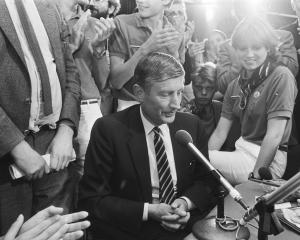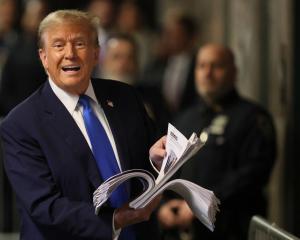In his first public appearance since meeting Russia's President Vladimir Putin last Friday, Yanukovich ignored the demands of pro-Europe protesters, hundreds of thousands of whom have taken to the streets in the past two weeks, including thousands camped out round-the-clock in freezing temperatures.
"We cannot talk about the future without talking about restoring trade relations with Russia," Yanukovich said in televised comments. He added he was also committed to European integration - wording he has often used since his government turned its back on a trade pact with the EU on November 21.
The protesters, who range from liberals to far-right nationalists, say Yanukovich and his government must resign. They are maintaining a tented camp in the snowbound capital's vast Independence Square and occupying public buildings, defying riot police who late on Monday pushed them from some streets.
The crisis has revealed stark divisions in the country of 46 million between those, mainly from the Russian-speaking east, who view Moscow as a source of stability and those, mainly from the Ukrainian-speaking west, who want to join the European mainstream and leave the orbit of the former Soviet master.
The crisis has weighed on an economy already on the brink of bankruptcy. The cost of insuring Ukrainian debt rose to the highest in four years on Tuesday. Bond prices fell sharply.
In a flurry of diplomacy, US assistant secretary of state Victoria Nuland and EU foreign policy chief Catherine Ashton both flew to Kiev. Nuland met the leaders of three main opposition parties. Ashton expressed concern that one of the parties' offices was raided by masked police on Monday.
Protesters, particularly those occupying City Hall a stone's throw from Independence Square, say they are braced for police action to eject them.
Police have largely shown restraint since Nov. 30, when they injured scores of demonstrators in clashes. Washington and the EU have urged authorities not to allow police violence.
Dozens of riot police removed barricades leading to the presidency, cabinet offices and parliament overnight but there were no clashes. Protesters regrouped at Independence Square.
Their 24-hour vigil in tents replays a tactic from the "Orange Revolution" in 2004 which successfully overturned a fraudulent election victory by Yanukovich. Ilya Shutov, an ex-miner from the eastern city of Donetsk, said the protesters would stay on the square until Yanukovich left office.
"We were for the EU association agreement because we thought it would force our authorities to be civilised. Their refusal of Europe is a refusal to be civilised," he said.
Yanukovich, in what was billed as a first step towards solving the crisis through talks involving opposition parties, met three former Ukrainian presidents on Tuesday. But his televised comments showed no readiness to reverse policy.
Nor did he give any details of last Friday's talks with Putin, though he said Moscow had agreed to discuss the price Ukraine pays for Russian gas - long a bone of contention. He spoke dismissively of terms for an International Monetary Fund loan, a sign he is not relying on the West for cash.
The opposition suspects Yanukovich may be readying to take Ukraine into a Moscow-led customs union, a prospect that brought hundreds of thousands of angry protesters to a rally on Sunday where demonstrators tore down and smashed a giant statue of Soviet founder Vladimir Lenin.
EU leaders say their trade pact would have brought investment, but Ukraine's Soviet-era industry relies on Russian natural gas, giving the Kremlin enormous leverage.
Kiev is due to pay just under $4 billion in debt repayments and Russian gas bills in the first three months of 2014. Its foreign reserves have been eroded to prop up the local hryvnia currency. Central Bank figures on Friday revealed only enough foreign currency on hand for less than two months of imports.
The IMF has pushed Ukraine to raise the domestic price of gas and allow the currency to float more flexibily, but the government has refused. If the Fund continued to insist on conditions then "such credit is not needed", Yanukovich said.
Nuland arrived in Kiev from talks in Moscow, where the US embassy said she expressed "deep concern" about the situation in Ukraine and urged Russia to use its influence to press for "peace, human dignity and a political solution".
The EU's Ashton expressed concern at a raid by masked police on the Kiev offices of jailed opposition leader Yulia Tymoshenko's political party. The EU considers Tymoshenko a political prisoner and had sought her freedom as part of the negotiations for the now-mothballed trade pact.
"I call on the Ukrainian authorities to exercise utmost restraint and refrain from any further use of force, in order to give space for a negotiated solution out of the current political stalemate," Ashton said in a statement.
Russia's State Duma, the lower house of parliament, approved a non-binding statement accusing Western nations of interfering in Ukraine and said the protesters in Kiev were destabilising the country. It urged the West to "stop mounting external pressure on the politics of a country that is brotherly to us".












